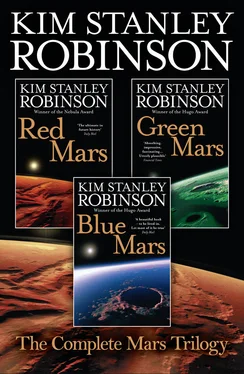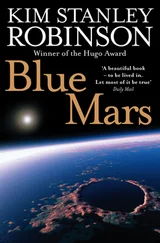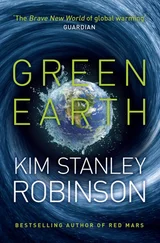Silence followed this remark.
Ann Clayborne said, “This treaty also says we have to take measures to prevent the disruption of planetary environments, I think is how they put it. It’s in Article Seven. That seems to me to expressly forbid the terraforming that so many of you are talking about.”
“I would say that we should ignore that provision as well,” Arkady said quickly. “Our own well-being depends on ignoring it.”
This view was more popular than his others, and several people said so.
“But if you’re willing to disregard one article,” Arkady pointed out, “you should be willing to disregard the rest. Right?”
There was an uncomfortable pause.
“All these changes will happen inevitably,” Sax Russell said with a shrug. “Being on Mars will change us in an evolutionary way.”
Arkady shook his head vehemently, causing him to spin a little in the air over the table. “No, no, no, no! History is not evolution! It is a false analogy! Evolution is a matter of environment and chance, acting over millions of years. But history is a matter of environment and choice, acting within lifetimes, and sometimes within years, or months, or days! History is Lamarckian! So that if we choose to establish certain institutions on Mars, there they will be! And if we choose others, there they will be!” A wave of his hand encompassed them all, the people seated at the tables, the people floating among the vines: “I say we should make those choices ourselves, rather than having them made for us by people back on Earth. By people long dead, really.”
Phyllis said sharply, “You want some kind of communal Utopia, and it’s not possible. I should think Russian history would have taught you something about that.”
“It has,” Arkady said. “Now I put to use what it has taught me.”
“Advocating an ill-defined revolution? Fomenting a crisis situation? Getting everyone upset and at odds with each other?”
A lot of people nodded at this, but Arkady waved them away. “I decline to accept blame for everyone’s problems at this point in the trip. I have only said what I think, which is my right. If I make some of you uncomfortable, that is your problem. It is because you don’t like the implications of what I say, but can’t find grounds to deny them.”
“Some of us can’t understand what you say,” Mary exclaimed.
“I say only this!” Arkady said, staring at her bug-eyed: “We have come to Mars for good. We are going to make not only our homes and our food, but also our water and the very air we breathe – all on a planet that has none of these things. We can do this because we have technology to manipulate matter right down to the molecular level. This is an extraordinary ability, think of it! And yet some of us here can accept transforming the entire physical reality of this planet, without doing a single thing to change ourselves, or the way we live. To be twenty-first century scientists on Mars, in fact, but at the same time living within nineteenth century social systems, based on seventeenth century ideologies. It’s absurd, it’s crazy, it’s – it’s —” he seized his head in his hands, tugged at his hair, roared “It’s unscientific! And so I say that among all the many things we transform on Mars, ourselves and our social reality should be among them. We must terraform not only Mars, but ourselves.”
No one ventured a rebuttal to that; Arkady at full throttle was pretty much unopposable, and a lot of them were genuinely provoked by what he had said and needed time to think. Others were simply disgruntled, but unwilling to cause too much of a fuss at this particular dinner, which was supposed to be a celebration. It was easier to roll one’s eyes, and drink to the toast. “To Mars! To Mars!” But as they floated around after finishing dessert, Phyllis was disdainful. “First we have to survive,” she said. “With dissension like this, how good will our chances be?”
Michel Duval tried to reassure her. “A lot of these disagreements are symptoms of the flight. Once on Mars, we’ll pull together. And we have more than just what we brought on the Ares to help us – we’ll have what the unmanned landers have brought already, shipments of equipment and food all over the surface and the moons. All that’s there for us. The only limit will be our own stamina. And this voyage is part of that – it’s a kind of preparation, a test. If we fail this part, we won’t even get to try on Mars.”
“Exactly my point!” Phyllis said. “We are failing in this.”
Sax stood, looking bored, and pushed off toward the kitchen. The hall was filled with the seashell roar of many small discussions, some of them acrimonious in tone. A lot of people were angry at Arkady, clearly; and others were angry at them for getting upset.
Maya followed Sax into the kitchen. As he cleaned his tray he sighed. “People are so emotional. Sometimes it seems like I’m stuck in an endless performance of the play No Exit. ”
“That’s the one where they can’t get out of a little room?”
He nodded. “Where hell is other people. I hope we don’t prove the hypothesis.”
A few days later the landers were ready. They would descend over a period of five days; only the Phobos team would stay in what was left of the Ares, guiding it to its near-docking with the little moon. Arkady, Alex, Dmitri, Roger, Samantha, Edvard, Janet, Raul, Marina, Tatiana, and Elena said their farewells, absorbed already in the task at hand, promising to descend as soon as the Phobos station was built.
The night before the descent Maya couldn’t sleep. Eventually she gave up trying, and pulled herself through the rooms and corridors, up to the hub. Every object was sharp-edged with sleeplessness and adrenalin, and every familiarity of the ship was countered or overwhelmed by some alteration, a lashed-down stack of boxes or a dead-end in a tube. It was as if they had already left the Ares. She looked around at it one last time, drained of emotion. Then she pulled herself through the tight locks, into the landing vehicle she had been assigned to. Might as well wait there. She climbed into her spacesuit, feeling, as she so often did when the real moment came, that she was only going through another simulation. She wondered if she would ever escape that feeling, if being on Mars would be enough to end it. It would be worth it just for that: to make her feel real for once! She settled into her chair.
A few sleepless hours later she was joined by Sax, Vlad, Nadia, and Ann. Her companions belted in, and they ran through the check-out together. Toggles were flipped, there was a countdown; and their rockets fired. The lander drifted away from the Ares. Its rockets fired again. They fell toward the planet. They hit the top of the atmosphere, and their single trapezoidal window became a blaze of Mars-colored air. Maya, vibrating with the craft, stared up at it. She felt tense and unhappy, focused backward rather than forward, thinking of everyone still on the Ares; and it seemed to her that they had failed, that the five of them in the lander were leaving behind a group in disarray. Their best chance for creating some kind of concord had passed, and they had not succeeded; the momentary flash of happiness she had felt while brushing her teeth had been just that, a flash. She had failed, then. They were going their separate ways, splintered by their beliefs, and even after two separate years of enforced togetherness they were, like any other human group, no more than a collection of strangers. The die was cast.
It formed with the rest of the solar system, around five billion years ago. That’s fifteen million human generations. Rocks banging together in space and then coming back and holding together, all because of the mysterious force we call gravity. That same mysterious warp in the weft of things caused the pile of rocks, when it was big enough, to crush in on its center until the heat of the pressure melted the rock. Mars is small but heavy, with a nickel-iron core. It is small enough that the interior has cooled faster than Earth’s: the core no longer spins inside the crust at a different speed and so Mars has practically no magnetic field. No dynamo left. But one of the last internal flows of the molten core and mantle was in the form of a huge anomalous lumping outward on one side, a shove against the crust wall that formed a continent-sized bulge, eleven kilometers high: three times as high as the Tibetan plateau is above its surroundings. This bulge caused many other features to appear: a system of radial fractures covering an entire hemisphere, including the largest cracks of all, the Valles Marineris, a lace of canyons that would cover the United States coast to coast. The bulge also caused a number of volcanoes, including three straddling its spine, Ascraeus Mons, Pavonis Mons and Arsia Mons; and off on its northwest edge, Olympus Mons, the tallest mountain in the solar system, three times the height of Everest, one hundred times the mass of Mauna Loa, the Earth’s largest volcano.
Читать дальше












